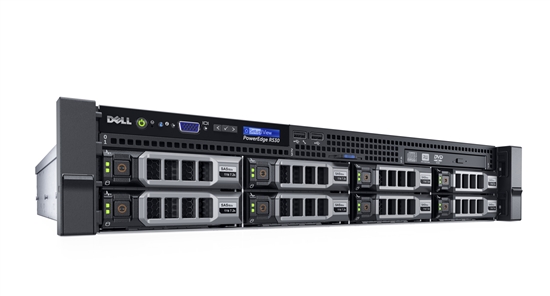Further enabling customers of all sizes to implement future-ready IT, we are excited to announce some key upgrades to our PowerEdge server portfolio. These upgrades further enable customers to realize peak performance, maximize operational efficiency and achieve even greater versatility by taking advantage of enhancements to our two-socket lineup of PowerEdge 13th generation servers, now with Intel Xeon processors E5-2600 v4.
Flexible, Versatile and Expandable
The Dell PowerEdge R530
The upgraded portfolio includes Dell PowerEdge R530 and R430 rack servers and the T430 tower server. Leveraging the new Intel Xeon E5-2600 v4 product family, customers can benefit from performance that drives common business applications, small-scale virtualization, and business transaction workloads. Thanks to the CPU family’s improved design and Dell’s Energy Smart implementation, this additional performance is delivered with the same or even less power consumption required, enabling capacity growth and lower total cost of ownership over the life of the product.
Here are some details on the new editions to our 13th generation family:
- PowerEdge R530: This flexible, 2U mainstream rack server is designed for a wide range of common business applications and small-scale virtualization and for dedicated development or backup server. PowerEdge R530 features up to 80% more cores compared to the previous-generation R520 server with E5-2600 v2 processors.
- PowerEdge R430: A versatile, dense 1U rack server that delivers peak performance and sizable internal storage for enterprise HPC, web tech and infrastructure scale-out. This upgraded server has up to 150% more processing cores compared to previous-generation E5-2600 v2 processors.
- PowerEdge T430: This expandable and highly available tower server is ideal for office environments and a wide range of collaboration and productivity applications, mail and messaging, file and print serving.
These two-socket rack and tower servers can easily accommodate data growth, and adapt to changing workload conditions with an expandable, virtualization-ready platform in a secure environment. Dell OpenManage delivers server administration with modern HTML5 support and provides server configuration management capabilities that simply and proficiently modify settings in response to evolving workload requirements.
Upgrades at every scale
Dell’s Extreme Scale Infrastructure (ESI) group is also upgrading its DSS products. The DSS 7000 –packs up to 90 3.5-inch drives into a 4U chassis for up to 720 terabytes of storage – is not only leveraging the new Intel Xeon E5-2600 v4 product family, but it’s now available with either one or two high performing server nodes. The single node version is ideal for video surveillance and archiving needs since one node talks directly to all 90 drives to provide maximum storage density at an affordable price. The dual-node version remains available for customers with increased performance needs such as running Ceph or other object based applications.
Then there’s the DSS 1500, DSS 1510 and DSS 2500 which are 1U and 2U servers targeted at service providers, web tech companies and carriers. Designed to deliver flexibility and scale while reducing infrastructure costs, these servers have the latest Intel Xeon processors and continue to feature minimalistic designs, flexible storage and IO options, and industry-standard systems management.
Today’s advancements place the PowerEdge 13th generation two-socket servers and DSS solutions from Dell at the forefront of choice for IT organizations needing prolific compute solutions today and in the years to come.
We look forward to sharing the next wave of server innovations with you in the coming weeks – and encourage you to reach out to us in the comments or on Twitter with your questions.

